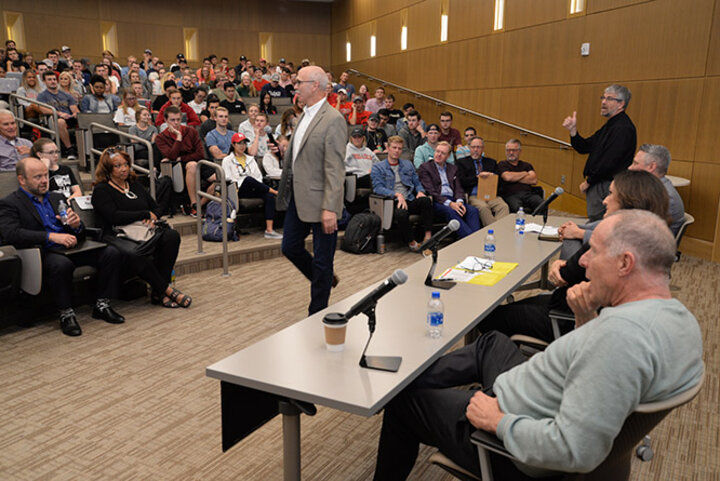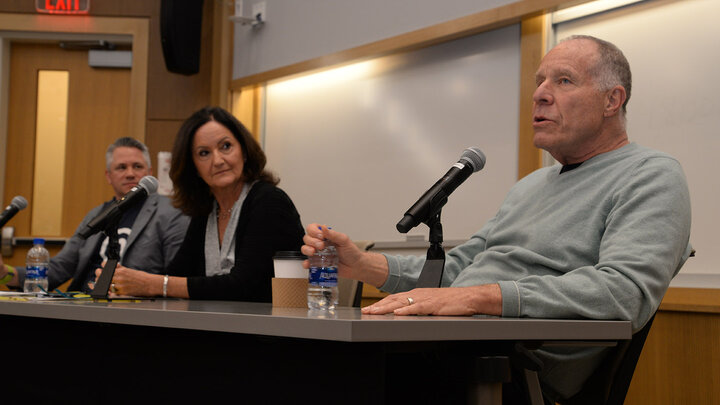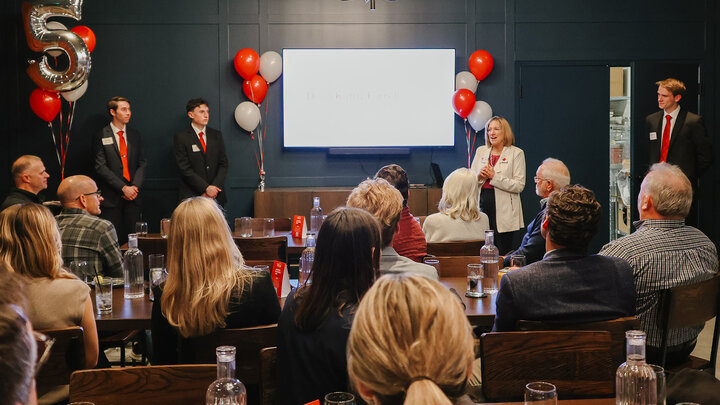The fall Executive Insights panel gave more than 400 students the opportunity to think about how ethical behavior shapes success in the business world. The event, hosted by State Farm Insurance and held at Howard L. Hawks Hall, underscored how contemplating ethical issues before they happen helps individuals make the right decisions when confronted with them in business or their personal lives.
Panelists for the event featured Paul Orfalea, founder of Kinko’s; Kay Vorheis, ’77, finance director at V2 Bio-Consulting; and Jeff Noordhoek, ’88, CEO of Nelnet. Orfalea set the tone for the event by presenting ethical decision-making in terms of every day conduct. He believes the simplicity of making the right decisions in your personal life can translate to making the right decisions in business.
“Every day you face ethical decisions in life,” Orfalea said. “You’re playing tennis and your opponent calls the ball out when you know it was in. Since they’re cheating, are you going to cheat too? If you’re called safe in baseball and you know you were out, does the ethics of the situation come to mind? It should. If you can’t explain an issue in the same simple language you would use with your mother something’s probably wrong.”
Vorheis echoed Orfalea’s comments by noting how her experiences often come back to having clarity with situations at hand. She witnessed firsthand how quarterly earnings expectations can tempt people to act unethically.
“As a CFO, the primary ethical decisions I’ve faced are pressures from transitioning from a private to publically held company,” Vorheis said. “Reporting requirements are immense to meet revenue and profitability estimates. Early on in my career, we were sometimes pressured to do things that fell into gray areas. Even if we had it planned out, the CEO might say something different than you had agreed to the day before. Everybody might have the right intention, but the pressure to say what management wants to hear can pull you down the wrong path. One time I had to go to in-house counsel and we had to have a forensic accounting investigation. I passed but the CEO didn’t.”

Noordhoek recounted his experience dealing with earnings analysts. It helped him draw a clearer boundary for future relationships working with earnings analysts.
“We learned to avoid some of those issues by staying away from earnings guidance,” Noordhoek said. “There are equity analysts who predict our earnings and give guidance to their clients. One time we missed that guidance by a penny per share. That affects the stock price if you miss the target projection. Of course, the equity analyst can’t believe we missed the number by only a penny, with the implication being we could have made up the penny by fudging the numbers. So we saw the negative ethical implications in the real world and were done with those forecasts.”
To help resolve internal problems at Nelnet, Noordhoek implemented a system to deal with difficult ethical situations.
“When decisions get to my desk, it usually has become a complicated situation someone can’t solve. There’s not always a right answer so when it’s not clear we try to be as transparent as possible. We have an ethical email service where employees can get help with anything they can’t answer themselves. We have leaders well-versed in how we want to operate get involved and help answer those questions,” he said.
Vorheis believes students that want to rise to executive leadership positions have an extra responsibility to conduct themselves ethically. She hopes College of Business students remember those responsibilities after graduation.
“Leadership starts from the top because you have to lead by example and create an environment of trust. It’s important to acknowledge and recognize the right behaviors being done in addition to the right results. So if you’re an executive and you get information that might not have been what you wanted to hear but it’s the truth, how does management respond to that? That spreads the right tone throughout the organization,” Vorheis said.
Students attending the event received the opportunity to question panelists, and asked how to guide employees as an executive of a large firm. At Kinko’s, Orfalea believes in treating employees in the same manner he would like others to treat him.
“You have to manage the culture of ethics and I do that by creating the right atmosphere through things such as profit sharing and being honest with people. Your employees know if you’re lying. You have to be impeccably honest and it pays to be ethical. If you’re one of those people that doesn’t declare all your income tax and then you have a bad accident, how are you ever going to recover your true damages if you never reported your income accurately? If you don’t play by the right rules, you’ll eventually be penalized. There’s a ying and a yang to everything you do in your life,” Orfalea said.




